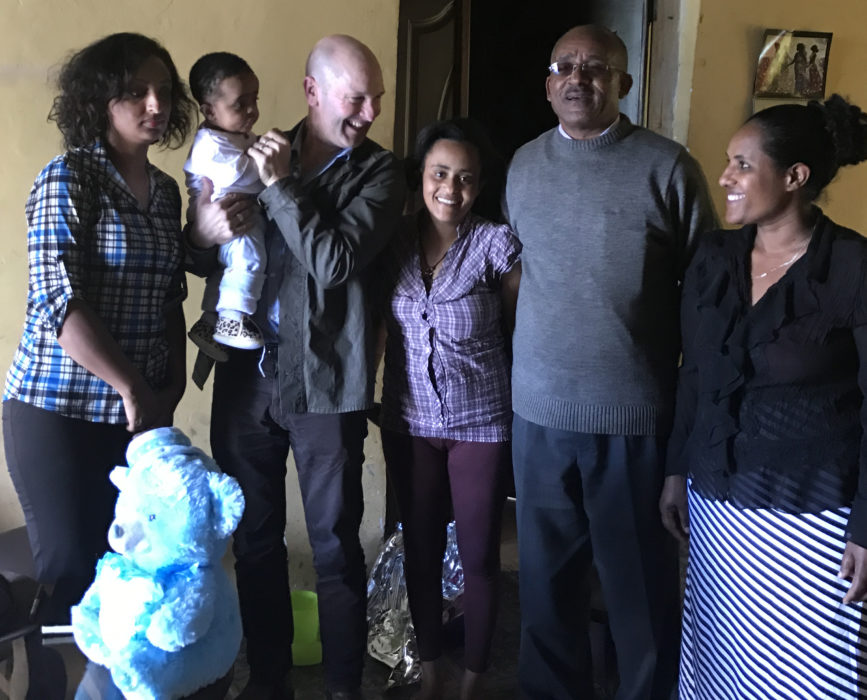In December last year I had the thrill to meet Hiwot and her six month old baby boy in Hosanna hospital in Ethiopia. Hiwot had complications in her pregnancy that were life threatening for her son and for her. Luckily, VSO volunteer health specialists had worked with Ethiopian medical staff to establish a specialist care centre for expectant mothers. Those volunteers had trained Ethiopian midwives to staff that centre and because of their training, they spotted that Hiwot was at risk and could provide the care she needed.
VSO doctors had also helped set up a neo-natal intensive care unit so that seriously ill babies can now also receive specialist care. As a result of their work over the last 4 years, VSO volunteers have helped hospital staff at Hosanna hospital to reduce the death rate of babies by 50%. As the medical director of Hosanna hospital said to me, “VSO volunteers have shown us how it is possible to develop low cost, high impact changes that save lives. They are helping us to transform this hospital”.
In Ethiopia, VSO volunteers are replicating this work in over 20 hospitals and working with the Ethiopian government to ensure that lessons learned are taken right across the health system.
This is the kind of impact that international volunteering can have in the 21st century – delivering concrete and sustainable impact that touches the lives of millions. In 2015-16 alone, VSO’s work reached 2.1 million people – not just in health but also in education and livelihoods.
Across 23 countries in Africa, Asia and the Pacific region, thousands of VSO volunteers from Britain and increasingly from across the globe are having a lasting impact by participating in unique professional and personal exchange which will stay with them and their communities for a lifetime.
A ground-breaking piece of research ‘Valuing Volunteering’ carried out by VSO in partnership with the UK’s Institute of Development Studies in 2016 looked in depth at the benefits of volunteering that works to tackle poverty.
It found that by living and working in the local community which they seek to serve, volunteers have a unique ability to reach the poorest and most marginalised, they can create a bridge to local services where they don’t currently exist, and can build strong personal bonds that can break through cultural barriers and promote positive change.
I saw the benefits of this approach first hand in Ethiopia. In that case it was literally making the difference between life and death. In our education and livelihoods programmes it is creating the opportunity for families to break out of poverty. It is making the difference between hope and despair.
But this isn’t just a one-way exchange. Although for the most part volunteers are already highly trained in their professional field, they nevertheless gain new skills, experiences and understanding. The opportunity to become immersed in an entirely new culture, new ways of thinking, of living is not something that is going to leave you lightly.
A survey of 2,800 VSO volunteers, the initial results of which were published in November 2016, found that 89% of volunteers said that their own resilience had increased due to their placement. 41% stated that they had become ‘a lot’ more adaptable while 35% ‘a lot’ more confident. Even for shorter term voluntary placements like the UK Government funded and VSO led International Citizen Service programme, 97% of the youth volunteers who completed their placement said that their time working on the project has helped them progress in their careers.
The impact goes beyond just the work itself. Volunteers build connections with the people and places they work that last a lifetime and the people they support never forget. People can remember the names of volunteers and the impact they have had decades later.
These connections between British people from all walks of life and backgrounds, with communities from across the world are immensely valuable to the UK, particularly in these uncertain times. Each volunteer is in effect an unofficial ambassador promoting our values, culture and expertise. In turn, the links forged by these volunteers enrich our own society, contributing to Britain remaining an outward looking and globally focused nation.
VSO and our model of volunteering is very different from the start of our work nearly six decades ago. As this BBC Magazine article makes clear, David Smith, VSO’s first volunteer back in 1958 received little in the way of guidance or training before heading out to Borneo at the age of 18 to teach students English most of whom were older then himself.
Nowadays VSO’s volunteers come highly trained in their professional fields and their resource is expended more on training and teaching their new colleagues rather than just doing themselves. The selection process for potential volunteers is more gruelling and rigorous, and they are better supported ahead of, during and post placement.
Nevertheless, our VSO pioneer, David Smith, does have something in common with all 43,000 of VSO’s volunteers ever since. That sense of courage to step assertively into the unknown and unfamiliar. Not just hoping for a different world but making a life changing commitment to contribute towards it’s realisation in a direct way. It’s an amazing thing that each and every one of them do.

